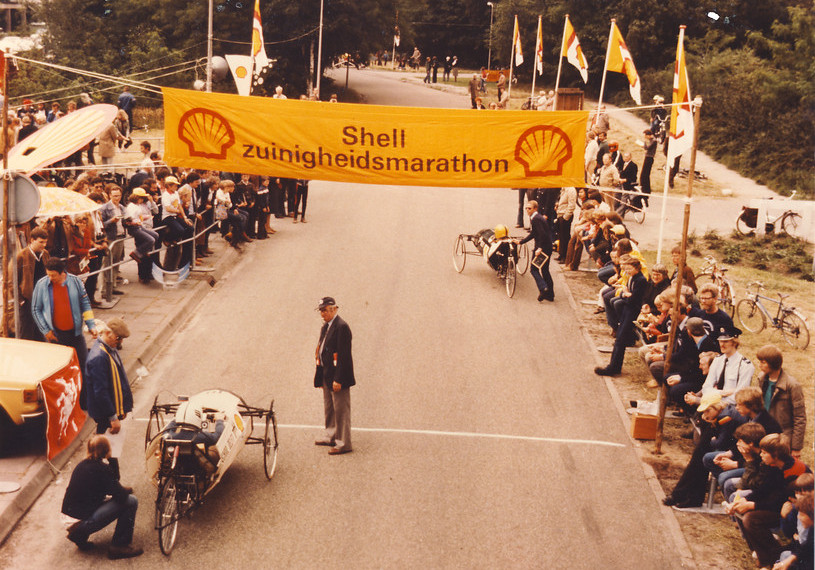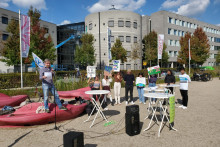Jean-Paul Lange, from Wallonia, is affiliated with the Sustainable Process Technology research group. He likes to come to the campus to talk about the combination of functions and the criticism of Shell. But due to a public transport strike, he is not sure whether that will work. In order to reduce the burden on the climate, he no longer drives a car. A conscious choice or an advanced form of greenwashing? ‘A conscious choice. I travel everywhere by public transport. The route Leiden to Enschede is easy to do by train and ov-bicycle. If I want to go to my son, who lives fifteen kilometres away, I take the bike. Now and then I do miss the car, so I signed up for a shared car.’
The professor has been supervising PhD students at UT for about ten years. Most of that research is exclusively commissioned by Shell. ‘To be clear right away: in all those years, no research has focused on fossil raw materials. I have been working at Shell for about twenty years, now as a Senior Principal Science Expert, and there as well, I have hardly ever had to deal with the fossil industry. In the nineties, I conducted research into sustainability in petrochemicals, but that did not yield any results. Society was not interested in that yet.’
Sources about climate change were public. At the time, politicians, NGOs, and consumers just didn't think it was threatening enough and preferred to set it aside.
Some frustration shines through his narrative. ‘Well, at the beginning of this month, it was big news that ExxonMobil knew in the seventies that the climate was going to warm up. I do not understand that kind of reporting. Everyone already knew that in those years. Sources about climate change were public. At the time, politicians, NGOs, and consumers just didn't think it was threatening enough and preferred to set it aside.'
 Avoiding ‘contamination’
Avoiding ‘contamination’
His colleague Arian Nijmeijer studied Chemical Engineering at UT in the nineties and obtained his PhD there in 1999, with research into silica membranes for hydrogen purification. Since 2007 he is a professor of Inorganic Membranes. In addition, he's Principal Science Expert at Shell. ‘I work with separation technologies, which are at the foundation of practically all technologies. This not only applies to fossil fuels but also biofuels and CO2.'
How does he separate the scientific from the industrial interests? ‘All the research I conduct is publicly funded, for example by NWO, and complies with the rules set by the grant provider. I have no direct sponsored PhD students from Shell. In addition, graduates work with publicly available data and their theses are published publicly. Moreover, I do not want to receive any emails with confidential information,' he says resolutely. ‘Just like Shell's Intellectual Property department says: 'Don't get contaminated'. I absolutely want to avoid that. Perhaps collecting publicly funded research is also a certain urge to prove that I could function as a normal professor, because I became a professor at the age of 34, while I was working at Shell in the meantime.'

Unlike Nijmeijer, Lange indicates that he attaches less importance to separate work activities. ‘I try to find the connection as much as possible, everyone benefits from that. The student likes to get into contact with the industry and Shell is interested in research into the energy transition.'
I have trouble understanding why they want to exclude a party. Shell has already shown that it invests.
‘The initiative is good, the execution bad’
Naturally, the professors follow the action at universities. From occupations in Amsterdam, Rotterdam, and Eindhoven, to banners and blockades – like last November on the UT campus. Although they both indicate that they understand the climate activists, they do not share their message in the least. Nijmeijer: 'I have trouble understanding why they want to exclude a party. Shell has already shown that it invests, for example in hydrogen plant Holland Hydrogen 1, in biofuel and carbon capture technology. We have the experience, expertise, and financial strength. Why wouldn't you want to collaborate in the energy transition with a party that also does this safely and has built up the expertise for this? The energy transition is big enough for all of us to work on it. We need a lot of engineers for that – whether they end up at Shell or elsewhere, that does not matter to me.'

Lange complements him. ‘The initiative of the activists is good, the execution very bad. I do not think it is right for the press to call Shell boogeyman. The complexity of the transition is not mentioned. Populist shouting about breaking ties will get us nowhere. It can be done, but then conduct academic research. Have a research group tackle that question: What is the influence of the fossil fuel industry on the energy transition? What works and what could be improved? I do not think that the perception of the activists is correct and that they wrongly point to Shell as a delaying factor in the transition.'
Move along with time
The UT and Shell are also linked on a smaller scale. Take, for example, the mechanical engineering study association Isaac Newton. It was faced with a blockade by climate activists last November when they had an excursion at the Shell refinery in Pernis. ‘It was peaceful and pleasant - and a couple members found it interesting to start the discussion,’ says Newton board member Jesper Kussendrager. The subsequent excursion at Shell was not a greenwashing exercise, he assures. ‘Dinner was free, but that was about it. We are mechanical engineers; we are mainly interested in what the technology in such a refinery and chemical factory looks like. And it stood out to me that our members asked critical questions during the excursion. They quickly realize when certain promises sound technically unfeasible.'

The study association receives sponsorship money from both Shell and ExxonMobil. Kussendrager does not want to say what amounts are involved. ‘It is enough to organize an activity such as an excursion or a networking drink, but that is where it ends. No, we are absolutely not financially dependent on the sponsor money. We can easily survive without it.’
Newton does not want to cut ties with the fossil fuel companies. ‘We have discussed it a lot within the association. What we as a board want above all is to be able to show the full breadth of the labour market – at the moment that simply includes the fossil fuel industry. I know that there are members who have Shell at the top of their list as a future employer,' says Kussendrager, who says that the study association moves along with time. ‘For future sponsorship, we aim explicitly for sustainable companies. We are not going to start any new collaborations with the biggest polluters.’
Provide a platform
Since last year, Shell has also been sponsoring a prize at the UT Challenge. In the entrepreneurship competition, student teams have a chance to win the Shell Energy Transition Award. 'A prize that was added precisely to get students to think along about the transition,' says project coordinator Jeroen Loos.
He understands that he is being questioned about the considerations for adding Shell to the prize arsenal. ‘In fact, as a steering group, we discussed it. We know that not everyone is a fan of the company. Should we provide Shell with a platform this way?', he wonders aloud. ‘We should because it asks students to think about the transition. Shell is a gigantic company, employing many people who want to do the right thing in the transition. If we get signs that the cooperation is not working, we will have to reassess it.'
 Magnifying glass
Magnifying glass
Professor Lange thinks he knows why activists focus so specifically on Shell. ‘Especially psychologically it is comfortable to portray Shell as the great evil. That takes away a lot of guilt. Yelling 'We have to get rid of Shell' and then get on a plane to Sri Lanka for a nice trip.' Although he also looks in the mirror. According to Lange, it does not help that Shell failed to live up to many ambitions and was reprimanded for greenwashing. ‘Many major transition projects failed to get off the ground, but that does not mean that Shell did not invest energy, time and money in them. Competitors also failed to deliver on their promises. The technology turned out to be much more complex and expensive than expected. While many start-ups are falling over, Shell continues to work on the transition.’
There were years when Shell was the national pride, but the company is increasingly under a magnifying glass. Do they still proudly tell on birthdays that they work for Shell? 'Absolutely. I still do and I will continue doing it', says Nijmeijer. ‘We are used to the magnifying glass. I understand that very well, also because we have a large number of activists in the Netherlands. And for climate activists, it also makes their message stronger if they point to one enemy, instead of multiple culprits.'
Lange, after a short hesitation: 'Shell is receiving a beating, so as an employee you must be more modest. You need to explain more, but I think I have that ammunition. I notice a lot of enthusiasm among Shell colleagues to make the world a better place, so I am certainly proud to work there. When the grandchildren ask me later if I helped make the world a better place, I want to be able to look them in the eye and tell them I did the right thing’



 Avoiding ‘contamination’
Avoiding ‘contamination’ Magnifying glass
Magnifying glass



